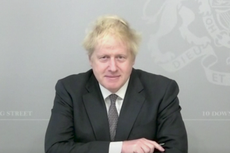Government paying £1m a day to stockpile thousands of shipping containers full of PPE
UK healthcare system reportedly run out of storage space
It has been claimed the government is paying £1m a day to store thousands of containers filled with PPE at a Suffolk port.
As many as 10,000 shipping containers — sometimes more, sometimes less — full of masks, aprons and gloves have been sat quayside at Felixstowe since August, despite NHS staff still reporting a severe lack of protective gear in their day-to-day jobs.
According to a pricing document seen by The Telegraph, the port, which is owned by Hutchison UK, charges £47.38 a day for any container that has been there longer than two weeks or more.
After a backlog saw approximately 11,000 government shipping containers at the port last week, it can be estimated that the government splurged £520,000 for a single day’s storage at Felixstowe.
But this figure increases significantly when the late charges of the rented shipping containers themselves are considered. Experts estimate shipping companies usually charge around £75 per container for every day a unit is not returned within an agreed time frame; this brings the government’s daily cost up to roughly £1.3m.
Fees are set at such high rates to deter companies from using the space as a long-term storage facility.
Eleanor Hadland, a ports analyst at maritime consultancy Drewry, told reporters yesterday: “If you leave your container in the main port yard it gradually gets more and more expensive to store it there. It’s a little bit like airport parking, imagine going away for a two-week holiday and leaving your car in the short stay car park at Heathrow. It’s not something you’d want to do.”
No payments would have been necessary had the supplies been collected and the containers returned on time — a unit typically spends 4.5 days at Felixstowe. But UK healthcare facilities are said to have run out of storage space, leaving the government with little choice.
The stockpile of equipment, which is big enough to fill an Olympic swimming poll five times over, amassed after officials panic bought supplies following the shortage of PPE in the first wave of Covid earlier this year.
Despite the mass purchases, though, unions have said that logjams and conflicting guidance restricting the use of PPE mean many frontline workers are still being forced to carry out high-risk procedures without protection.
The government is thought to have made moves to get the containers to other sites, including former airfields, but on Saturday there were reportedly still around 9,000 containers full of PPE at Felixstowe. There are thought to be smaller backlogs at other ports too.
Appearing to contend the figures being circulated, a government spokesman said over the weekend: “We have a storage network in place that lets us access and manage our PPE supply to meet demand throughout the winter.
“The amount of PPE stock held on quay at Felixstowe is already coming down rapidly, from nearly 7,000 containers in late October to under 4,000 now, with further reductions expected up to Christmas.”
The government previously admitted to a PPE stockpiling scheme in September, when news of the Covid second wave was first announced. It confirmed four months worth of PPE — 32 billion items, including gowns and masks — was in place to protect key workers during the winter.
One “well-placed” source, who remained anonymous, told The Telegraph: “Somebody got caught short in the first wave and they’ve compensated, and probably overcompensated, by buying tonnes of PPE and the whole thing wasn't thought through fully.
“They went out, bought loads of it and nobody thought: ‘Well, what are we going to do with all this PPE once we get it, where are we going to store it?’ So all this PPE has arrived and no one knows quite what to do with it now because it’s arrived an awful lot more quickly than it can be used.”
Join our commenting forum
Join thought-provoking conversations, follow other Independent readers and see their replies
Comments

Bookmark popover
Removed from bookmarks